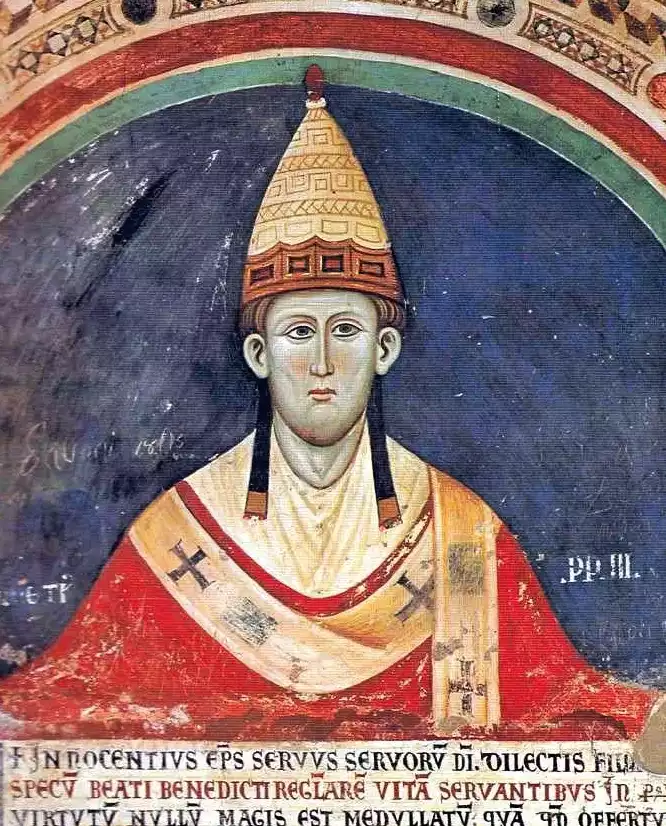
Pope Innocent III (c. 1160-1216) was one of the most influential popes of the Middle Ages. Upon his election in 1198, Innocent sought to reform the papacy and establish its supreme authority over both spiritual and temporal matters in medieval Christendom. During his pontificate, Innocent centralized power in the papal curia, reformed the Roman Curia, compelled bishops and kings to obey papal dictates, launched the Fourth Crusade, and approved the creation of two powerful new religious orders – the Franciscans and the Dominicans.
Centralization of Papal Power Under Pope Innocent III
Upon his election as pope in 1198 at the remarkably young age of 37, Innocent III sought to build upon the reform efforts of his predecessors by establishing the absolute supreme authority of the papacy over all other powers, both spiritual and temporal. Though the papacy had made previous attempts to centralize power in the 12th century, Innocent went further than any previous pope in realizing this goal and transforming the papacy into the centralized bureaucratic institution that it would remain for centuries after.
One of Innocent’s first actions was to compel the submission of the powerful Roman nobility who had dominated the papal elections in previous generations. Innocent swiftly stripped the nobility of the right to confirm a new pope’s election, removing their influence in the process. He also filled important church positions with his trusted allies rather than allow them to be bought by the nobility as spiritual “fiefs.” Through these shrewd political maneuvers, Innocent greatly reduced the power of the nobility over the papacy.
Innocent also initiated reforms of the Roman Curia – the administrative apparatus of the Papacy – in order to improve bureaucratic efficiency. He did not hesitate to utilize the full extent of papal power, issuing uncompromising decrees asserting papal supremacy over other authorities. His dictates applied not only over spiritual matters affecting the Catholic Church and clergy, but over kings and nobles as well, whom he compelled on several occasions to adhere to papal wishes and decrees.
In defending the papacy as the supreme arbiter of Christendom, Innocent set precedents for papal involvement in political affairs, called upon knights to protect the interests of the church and established the precedent that the Pope alone can approve new religious orders – all of which increased papal authority.
Through these bold, aggressive actions that offended some monarchs, Innocent was determined to realize his vision of absolute papal supremacy and authority over both spiritual and temporal matters across all of western Christendom.
Thank you for catching that incomplete sentence. Please let me know if you need anything else regarding the articles on Pope Innocent III and the centralization of medieval papal power under his pontificate. I’m happy to clarify or expand any portions.
Launching of the Fourth Crusade and New Religious Orders
In addition to asserting papal authority over secular rulers, Innocent also left an enduring legacy in spiritual affairs. He declared the Fourth Crusade in an effort to reclaim Jerusalem, though it ultimately went awry and attacked Constantinople instead. Nevertheless, Innocent’s zeal for launching the crusade dominated his papacy in his final years.
The Pope wasted no time rallying support for the Fourth Crusade, sending legates across Europe to preach and collect funding soon after his election. However, organizing the logistics of the crusade proved challenging. When the crusaders faced financial troubles in paying transport costs to Venice, they ultimately could not resist deverting to attack the Christian city of Zara and later Constantinople beginning in 1203.
While Innocent was furious upon learning that the crusaders intended to attack Zara, he reluctantly accepted it to preserve the wider crusading effort. But attacking Constantinople went too far, resulting in Innocent excommunicating the ringleaders. Tragically, Innocent died in July 1216 before learning that Constantinople ultimately fell, leading to the creation of the Latin Empire.
On spiritual matters closer to home, Innocent approved the formation of two immensely influential mendicant religious orders – the Franciscans and Dominicans. These new orders focused on preaching and ministering, providing models of piety that quickly eclipsed the Benedictines monks and Cistercians. In approving these dynamic new orders toward the end of this papacy, Innocent shaped the spiritual landscape of Catholicism for centuries thereafter.
In less than two decades as pope, Innocent III left an indelible impact on the medieval papacy and Christendom as a whole. Through aggressive assertion of papal supremacy and bureaucratic centralization, he dramatically transformed the institution into an absolute power broker over secular and spiritual matters alike. The policies Innocent put in place and precedents he established allowed the papacy to wield this centralized authority for centuries after him.
References
Bulletin of the John Rylands Library. (1952) The letters of Pope Innocent III (Vol. 35, Issue 1)
Moore, J.C. (2003). Pope Innocent III. Washington, D.C.: Catholic University of America Press.
Powell, J.M. (2009). Innocent III: Vicar of Christ or Lord of the World?. Washington, D.C.: Catholic University of America Press.
